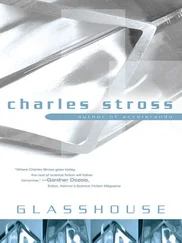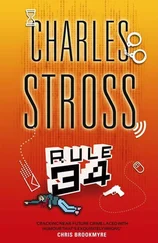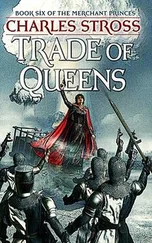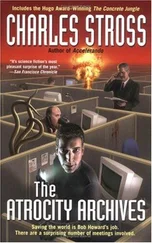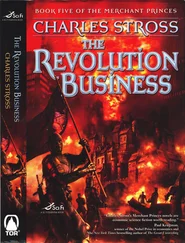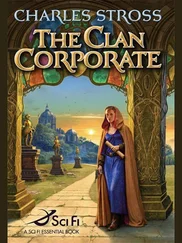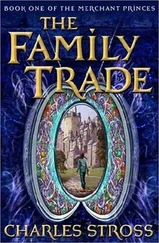Charles Stross - The Merchant’s War
Здесь есть возможность читать онлайн «Charles Stross - The Merchant’s War» весь текст электронной книги совершенно бесплатно (целиком полную версию без сокращений). В некоторых случаях можно слушать аудио, скачать через торрент в формате fb2 и присутствует краткое содержание. Жанр: sf_writing, на русском языке. Описание произведения, (предисловие) а так же отзывы посетителей доступны на портале библиотеки ЛибКат.
- Название:The Merchant’s War
- Автор:
- Жанр:
- Год:неизвестен
- ISBN:нет данных
- Рейтинг книги:5 / 5. Голосов: 1
-
Избранное:Добавить в избранное
- Отзывы:
-
Ваша оценка:
- 100
- 1
- 2
- 3
- 4
- 5
The Merchant’s War: краткое содержание, описание и аннотация
Предлагаем к чтению аннотацию, описание, краткое содержание или предисловие (зависит от того, что написал сам автор книги «The Merchant’s War»). Если вы не нашли необходимую информацию о книге — напишите в комментариях, мы постараемся отыскать её.
The Merchant’s War — читать онлайн бесплатно полную книгу (весь текст) целиком
Ниже представлен текст книги, разбитый по страницам. Система сохранения места последней прочитанной страницы, позволяет с удобством читать онлайн бесплатно книгу «The Merchant’s War», без необходимости каждый раз заново искать на чём Вы остановились. Поставьте закладку, и сможете в любой момент перейти на страницу, на которой закончили чтение.
Интервал:
Закладка:
END TRANSCRIPT
Chapter 5
It was a warm day in New London, beneath the overcast. A slow onshore breeze was blowing, but the air remained humid and close beneath a stifling inversion layer that trapped the sooty, smelly effusions of a hundred thousand oil-burning engines too close to the ground for the comfort of tired lungs.
Two figures walked up the street that led away from Hogarth Villas, arm in arm: a tall, stooped man, his hair prematurely graying, and a woman, her shoulder-length black hair bundled up beneath a wide-brimmed sun hat. The man carried a valise in his free hand. They were dressed respectably but boringly, his suit clean but slightly shiny at elbows and seat, her outfit clearly well worn.
"Where now?" Miriam asked as they reached the end of the row of brick villas and paused at the curb, waiting for a streetcar to jangle and buzz past with a whine of hot electric motors. "Are we going straight back to Boston, or do you have business to attend to first?"
"Come on." He stepped out into the street and crossed hastily.
She followed: "Well?"
"We need to take the Northside 'car, three miles or so downtown." He was staring at a wooden post with a streetcar timetable pasted to a board hanging from it. "Then a New Line car to St. Peter's Cross. I think there's a salon there." He glanced sidelong at her hair. "By the time we've got that out of the way-well, unless we find a mail express, I don't think we'll get back to Boston tonight, so I suggest we take a room in one of the station hotels and entrain at first light tomorrow."
"Right." She shrugged, slightly uncomfortably. "Erasmus, when I crossed over, I, um, I didn't bring any money..."
He glanced up and down the street, then reached into an inner pocket and withdrew a battered wallet. "One, two-all right. Five pounds." He curled the large banknotes between bony fingertips and slipped them into her hand. "Try not to spend it all at once."
Miriam swallowed. One pound-the larger unit of currency here-had what felt like the purchasing power of a couple of hundred dollars back home. "You're very generous."
He smiled at her. "I owe you."
"No, you- " She paused, trying to get a grip on the sense of embarrassed gratitude. "Are you still taking the tablets?"
"Yes. It's amazing." He shook his head. "But that's not what I meant. I still owe you for the last consignment you sold me." A shadow crossed his face. "You needn't worry about money for the time being. There are lockouts and beggars defying the poor laws on every other street corner. Nobody has money to spend. If I was truly dependent on my business for a living I would be as thin as a sheet of paper by now."
"There's no money?" She took his arm again. "What's the economy doing?"
"Nothing good. We're effectively at war, which means there's a blockade of our Atlantic trade and shipping raiders in the Pacific, so it's hit overseas trade badly. His majesty dismissed parliament and congress last month, you know. He's trying to run things directly, and the treasury's near empty: we'll likely as not be stopped at the Excise bench as we arrive in Boston, you know, just to see if there's a silver teapot hiding in this valise that could be better used to buy armor plate for the fleet."
"That's not good." Miriam blinked, feeling stupid. How not good? she wondered uneasily. "Is the currency deflating?"
"I'd have said yes, but prices are going up too. And unemployment." Burgeson smiled humorlessly. "This war crisis is simply too damned soon after the last one, and the harvest last year was a disaster, and the army is overstretched dealing with civil disorder-they mean local rebellions against the lax inspectorate-on the great plains and down south." It took Miriam a moment to remember that down south didn't mean the southern United States- it meant the former Portuguese and Spanish colonies that the New British crown had taken by force in the early nineteenth century, annexing to the empire around the time they'd been rebelling against their colonial masters across the ocean in the world she'd grown up in. "And the price of oil is going up. It's doubled since this time last year."
Miriam blinked again. The dust and the smelly urban air were getting to her eyes. That, and something about Burgeson's complaint sounded familiar... "How's the government coping?" she asked.
He chuckled. "It isn't: the king dismissed it. We're back into the days of fiat reale, like the way King Frederick the Second ran things during the civil war." He noticed her expression and did a double take. "Seventeen ninety-seven to eighteen hundred and four," he murmured. "I can find you a book on it if it interests you. Long and the short is, there was a war across the Atlantic and the states of Carolina, Virginia, and Columbia tried to rebel against the Crown, in collusion with the French. They nearly mustered a parliamentary majority for secession, too: invited in a French pretender to take their crown. So Frederick dissolved the traitor parliament and went through the plantation states with fire and the sword. He wasn't merciful, like your, ah, Mister Lincoln. Frederick was not stupid, though: he recognized the snares of unencumbered absolute power, and he reconvened the estates and allowed them to elect a new parliament-once he'd gibbeted the traitors every twenty feet along the road from Georgetown to New London." "That's martial law, isn't it?"
"No, it's worse: it's the feudal skull showing through the mummified skin of our constitutional settlement." Erasmus stared into the near distance, then stuck his arm out in the direction of the street. A moment later a streetcar lumbered into view round the curve of the road, wheels grinding against the rails as it trundled to a halt next to the stop. "After you, ma'am."
Miriam climbed onto the streetcar's platform, waited while Erasmus paid, then climbed the stairs to the upper deck, her mind whirling. Things have been going downhill fast, she realized: war, a liquidity crisis, and martial law? Despite the muggy warmth of the day, she shivered. Looking around, she realized the streetcar was almost empty. The conductor's bell dinged and the 'car moved off slowly as Erasmus came up the stairs, his hair blowing in the breeze that came over the open top of the vehicle. Sparks crackled from the pickup on top of the chimneylike tower behind her. "I didn't realize things were so bad," she remarked.
"Oh, they're bad all right," he replied a little too loudly: "I'll be lucky to make my rent this month."
She gave him an old-fashioned look as he sat down beside her. "Afraid of eavesdroppers?" she muttered.
"Yes," he whispered, almost too quietly to hear.
Whoops. Miriam shut up and stared out the window as the city unrolled to either side. This city might be called New York, but the layout was bewildering; from the citadel and palaces of Manhattan Island-here called New London-to the suburbs sprawling across the mainland around it, Jersey City to Brookhaven, everything was different. There was no orderly grid, but an insane mishmash of looping and forking curlicues, as if village paths laid out by drunkards had grown together, merging at the edges: high streets and traffic circles and weird viaducts with houses built on top of them. Tenement blocks made of soot-stained brick, with not a single fire escape in sight. In the distance, blocky skyscrapers on the edge of the administrative district around the palace loomed on the skyline, but they weren't a patch on her New York, the New York of the Chrysler and the Empire State buildings and, not long ago, the twin towers. High above them a propeller aircraft droned slowly across the underside of the clouds, trailing a thin brown smear of exhaust. For a moment she felt very alone: a tourist in the third world who'd been told her ticket home was invalid. I wanted to escape, didn't I? To cut loose and go where the Clan can't find me. She pondered the irony of the change in her circumstances: it all seemed so long ago, now.
Читать дальшеИнтервал:
Закладка:
Похожие книги на «The Merchant’s War»
Представляем Вашему вниманию похожие книги на «The Merchant’s War» списком для выбора. Мы отобрали схожую по названию и смыслу литературу в надежде предоставить читателям больше вариантов отыскать новые, интересные, ещё непрочитанные произведения.
Обсуждение, отзывы о книге «The Merchant’s War» и просто собственные мнения читателей. Оставьте ваши комментарии, напишите, что Вы думаете о произведении, его смысле или главных героях. Укажите что конкретно понравилось, а что нет, и почему Вы так считаете.

